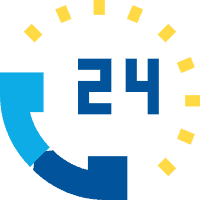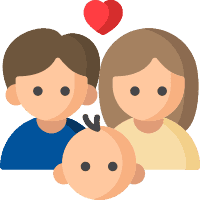Does your school-age child regularly mix up past, present, and future tenses when speaking or writing? Does your three-year-old still speak in two-word phrases? Do they struggle to remember words or grow their vocabulary? These are just a few symptoms of expressive language disorders.
Children with expressive language disorders usually struggle with written and verbal communication, which can lead to learning difficulties, low self-esteem, and a hard time socializing. Thankfully, early intervention and appropriate treatments can help many children overcome these challenges and catch up with their peers.
What Is Expressive Language Disorder
Expressive language disorder is considered a developmental disorder, and it is common in school-age children. Kids with this condition usually have lower than average vocabulary, struggle to use complex sentences, and often have a hard time remembering words.
Children might use shorter sentences or simpler grammatical structures than their peers. You might also notice your child using limited grammar structures or sentence types (for example, only making statements and not asking questions). Some children leave out critical parts of sentences or use unusual word orders.
However, kids with expressive language disorders usually have typical language comprehension. They don’t struggle to understand verbal or written communication; they only struggle to speak or write.
Signs of expressive language disorder
The signs and symptoms can vary widely. Here are some of the most common signs:
Improper sequencing: Do you notice your child struggling to put language together in the logical order? Perhaps they have a hard time putting events in the right order when they tell a story or struggle to put the steps of an activity in the correct order.
Difficulty using correct grammar: English language grammar is challenging to learn, but children with expressive language disorders often struggle to use proper grammar. Their sentences may be short, choppy, or difficult to understand. For example, children with a language delay may struggle with grammatical issues like? verb conjugation, mixing of verb tenses or deleting the to be verb.
Questions and answers: Children may have difficulty forming an appropriate response to a question then saying it aloud. They might also struggle to ask questions.
Limited vocabulary: One of the most common symptoms is a limited vocabulary that is not on par with their age and stage of development. Children with a limited vocabulary have a hard time saying what they want to say. They may struggle to remember words or take much longer than their peers to learn new vocabulary.
Difficulty understanding figurative language: Kids with expressive language delay often struggle to comprehend metaphors, similes, idioms, and other types of figurative language.
Expressive language disorder is not the same as autism
Nearly all children diagnosed with Autism Spectrum Disorder (ASD) have some communication difficulty (which might include an expressive language disorder). However, the two are not the same, and a child can have one without the other. Many children diagnosed with an expressive language disorder are not diagnosed with autism.
Causes of Expressive Language Disorder
Often, the cause goes unknown. Some kids experience expressive language disorder because of other known developmental delays (like hearing loss, autism, or Down Syndrome). Other children seem to develop these disorders without any related developmental challenges or delays.
Some children may experience expressive language disorders from birth, while other kids begin to struggle when they get older. Trauma (like a concussion or other head injuries) or other medical conditions can lead to or contribute. Malnutrition may be a contributing factor in some cases.
How to diagnose an expressive language disorder
If you notice your child struggling to express themselves or if they seem to be lagging behind their peers, a speech pathologist can assess their language skills and look for specific disorders.
In the assessment, a speech pathologist may recommend a variety of tests to help identify the problem. An auditory processing test, conducted by an audiologist, checks to make sure your child process the auditory information that they are being presented with. If your child is school-aged, the speech pathologist may screen for learning disabilities that might contribute to their language development difficulties.
The speech pathologist may also recommend an assessment of cognitive function (usually performed by a registered psychologist). It is also helpful to have your child’s hearing tested by an audiologist.
Treatment Options for Expressive Language Disorders
The severity of these disorders can vary considerably, and each child is unique. So, the treatment plan for each child should match their specific strengths and needs. Most children will benefit from speech therapy to stimulate overall language development and teach language skills in a way that the child can comprehend.
Some children benefit from group sessions with a speech pathologist, where everyone practices language skills together. The speech pathologist might also recommend individual therapy sessions where the pathologist can focus on helping your child master specific language skills.
Many schools also offer language intervention programs and assistance from special education teachers. Children with severe disorders may benefit from having a teacher’s aide as part of their academic intervention.
The speech pathologist might also recommend combining a home program with other treatment plans. Home programs equip parents, caregivers, and other family members with the tools to help their child express themselves with written and verbal communication at home.
The speech pathologists and staff at The Center for Speech And Language Development have extensive experience helping children and adults of all ages address and manage symptoms of expressive language disorders. Contact us today to learn more about our services that include diagnosis, treatment plans, and therapies.


